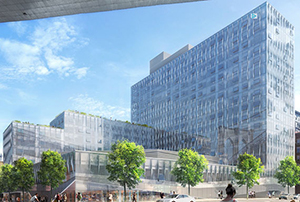Forget rooftop lap pools and doggy spas: The hottest new amenity in New York City buildings is public school.
At least, that’s the hope of Lorraine Grillo, president of the city’s School Construction Authority. Grillo said the authority has funding for new schools in Brooklyn — roughly 3,000 new seats in Downtown Brooklyn alone — but is having a difficult time finding space to build them.
She said including schools in residential buildings can be “a great selling point for developers,” since tenants can conveniently drop their kids off and then head off to work. She cited the middle school that is slated to open in Two Trees Management‘s new development on Dock Street in Dumbo, which will serve up to 315 students starting in September. She said the shortage in space that can be developed has forced the city to get creative in finding locations for new schools.

Two Trees Management’s 60 Water Street in Dumbo
“We’ll do any kind of space, any kind of configuration, any location,” she said. “All rules are out the window now because space is really at a premium.”
Grillo spoke at TerraCRG’s Only Brooklyn Real Estate Summit on Wednesday as part of a panel focused on infrastructure in the borough. The panel discussed Brooklyn’s infrastructure needs and the projects, such as the Brooklyn-Queens Connector (BQX), that have been proposed to help meet them.
Joe Lhota, vice dean of New York University’s Langone Medical Center and former chairman of the Metropolitan Transportation Authority, said the proposed 16-mile streetcar system would provide a much needed way to travel through the borough.
“If you look at Brooklyn, it is probably the most difficult place in the city to get around,” he said. “If you live in Cobble Hill and want to go to Williamsburg or Greenpoint, it’s not an easy thing to do.”
When asked by an audience member if the $2.5 billion project will actually ever get built, Tucker Reed, president of the Downtown Brooklyn Partnership, acknowledged that there are some obstacles ahead, like getting approval through the Uniform Land Use Review Procedure (ULURP) process. Still, he said the BQX will only intrude on six inches of existing roadway, so the actual construction process shouldn’t cause too much disruption.
Lhota also weighed in on the pending L Train shutdown, saying that he favors the option that would completely shutdown service for 18 months rather than offering partial service for repairs that would take an estimated three years to complete.
“Stop and go, stop and go is not how you get things done,” he said.
